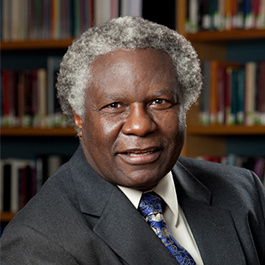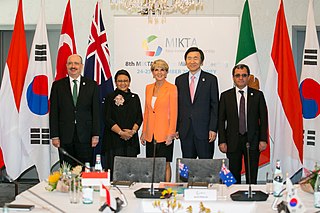Related Research Articles

The World Health Organization (WHO) is a specialized agency of the United Nations responsible for international public health. It is headquartered in Geneva, Switzerland, and has six regional offices and 150 field offices worldwide.

The United Nations Population Fund (UNFPA), formerly the United Nations Fund for Population Activities, is a UN agency aimed at improving reproductive and maternal health worldwide. Its work includes developing national healthcare strategies and protocols, increasing access to birth control, and leading campaigns against child marriage, gender-based violence, obstetric fistula, and female genital mutilation.
The United Nations Development Programme (UNDP) is a United Nations agency tasked with helping countries eliminate poverty and achieve sustainable economic growth and human development. The UNDP emphasizes developing local capacity towards long-term self-sufficiency and prosperity.

In the United Nations, the Millennium Development Goals (MDGs) were eight international development goals for the year 2015 created following the Millennium Summit, following the adoption of the United Nations Millennium Declaration. These were based on the OECD DAC International Development Goals agreed by Development Ministers in the "Shaping the 21st Century Strategy". The Sustainable Development Goals (SDGs) succeeded the MDGs in 2016.

The United States President's Emergency Plan For AIDS Relief (PEPFAR) is a United States governmental initiative to address the global HIV/AIDS epidemic and help save the lives of those suffering from the disease. Launched by U.S. President George W. Bush in 2003, as of May 2020, PEPFAR has provided about $90 billion in cumulative funding for HIV/AIDS treatment, prevention, and research since its inception, making it the largest global health program focused on a single disease in history until the COVID-19 pandemic. PEPFAR is implemented by a combination of U.S. government agencies in over 50 countries and overseen by the Global AIDS Coordinator at the United States Department of State. As of 2023, PEPFAR has saved over 25 million lives, primarily in sub-Saharan Africa.

The United Nations Research Institute for Social Development (UNRISD) is "an autonomous research institute within the United Nations that undertakes multidisciplinary research and policy analysis on the social dimensions of contemporary development issues". UNRISD was established in 1963 with the mandate of conducting policy-relevant research on social development that is pertinent to the work of the United Nations Secretariat, regional commissions and specialized agencies, and national institutions.

Calestous Juma was a Kenyan scientist and academic, specializing in sustainable development. He was named one of the most influential 100 Africans in 2012, 2013 and 2014 by the New African magazine. He was Professor of the Practice of International Development and Faculty Chair of the Innovation for Economic Development Executive Program at Harvard Kennedy School. Juma was Director of the School's Science, Technology and Globalization Project at Harvard Kennedy School as well as the Agricultural Innovation in Africa Project funded by the Bill and Melinda Gates Foundation. His last book, Innovation and Its Enemies: Why People Resist New Technologies, was published by Oxford University Press in 2016.

The Council for International Organizations of Medical Sciences (CIOMS) is an international non-governmental organization of 40 international, national, and associate member groups representing the biomedical science community. It was jointly established by the World Health Organization (WHO) and United Nations Educational, Scientific and Cultural Organization (UNESCO) in 1949 as a successor to the International Medical Congress that organized 17 conferences from 1867 until the 1913 outbreak of World War One.
The Commission on Legal Empowerment of the Poor was an independent international commission, hosted by the United Nations Development Programme (UNDP), and established in 2005 as the “first global initiative to focus on the link between exclusion, poverty, and the law.” Drawing on three years of research and consultations, the Commission proposed strategies for creating inclusive development initiatives that would empower those living in poverty through increased protections and rights.

HIV and AIDS is a major public health issue in Zimbabwe. The country is reported to hold one of the largest recorded numbers of cases in Sub-Saharan Africa. According to reports, the virus has been present in the country since roughly 40 years ago. However, evidence suggests that the spread of the virus may have occurred earlier. In recent years, the government has agreed to take action and implement treatment target strategies in order to address the prevalence of cases in the epidemic. Notable progress has been made as increasingly more individuals are being made aware of their HIV/AIDS status, receiving treatment, and reporting high rates of viral suppression. As a result of this, country progress reports show that the epidemic is on the decline and is beginning to reach a plateau. International organizations and the national government have connected this impact to the result of increased condom usage in the population, a reduced number of sexual partners, as well as an increased knowledge and support system through successful implementation of treatment strategies by the government. Vulnerable populations disproportionately impacted by HIV/AIDS in Zimbabwe include women and children, sex workers, and the LGBTQ+ population.

The United Nations University World Institute for Development Economics Research (UNU-WIDER) is part of the United Nations University (UNU). UNU-WIDER, the first research and training centre to be established by the UNU, is an international academic organization set up with the aim of promoting peace and progress by bringing together leading scholars from around the world to tackle pressing global problems.
The International Vaccine Institute (IVI) is an independent, nonprofit, international organization founded on the belief that the health of children in developing countries can be dramatically improved by the use of new and improved vaccines. Working in collaboration with the international scientific community, public health organizations, governments, and industry, IVI is involved in all areas of the vaccine spectrum – from new vaccine design in the laboratory to vaccine development and evaluation in the field to facilitating sustainable introduction of vaccines in countries where they are most needed.
The Global Forum for Health Research is an international foundation headquartered in Geneva, Switzerland, established in 1997 to increase the amount of research into global health issues. It coined the phrase 10/90 gap to identify the observation that only 10% of the world's health research spending is targeted at 90% of present health problems.
The social protection floor (SPF) is the first level of protection in a national social protection system. It is a basic set of social rights derived from human right treaties, including access to essential services and social transfers, in cash or in kind, to guarantee economic security, food security, adequate nutrition and access to essential services.

MIKTA is an informal middle power partnership between Mexico, Indonesia, South Korea, Turkey, and Australia. It is led by the Foreign Ministers. It was created in 2013 on the sidelines of the United Nations General Assembly in New York City and aims to support effective global governance.

In the United Nations, the Post-2015 Development Agenda was a set of talks and discussion that led to the creation of the 2016 Sustainable Development Goals. This replaced the 2015 Millennium Development Goals.
GAHP (Global Alliance on Health and Pollution) is a network of international and national level agencies committed to a collaborative, multi-sectoral approach to address the global pollution crisis and the resulting health and economic impacts. GAHP’s overall goal is to reduce death and illness caused by all forms of toxic pollution, including air, water, soil and chemical wastes especially in low and middle-income countries.
In global health, priority-setting is a term used for the process and strategy of deciding which health interventions to carry out. Priority-setting can be conducted at the disease level, the overall strategy level, research level, or other levels.

Sustainable Development Goals and Nigeria is about how Nigeria is implementing the Sustainable Development Goals within the thirty-six states and its Federal Capital Territory (FCT). The Sustainable Development Goals (SDGs) consist of seventeen global goals designed as a "blueprint to achieve a better and more sustainable future for all". Each of the 17 goals is expected to be achieved by 2030 in every country around the world.
Health policy and systems research (HPSR) is a field of inquiry that studies "how societies organize themselves in achieving collective health goals, and how different actors interact in the policy and implementation processes to contribute to policy outcomes". HPSR is interdisciplinary and brings together expertise in a variety of biomedical and social sciences such as economics, sociology, anthropology, political science, public health and epidemiology.
References
- 1 2 "Health Research: Essential Link to Equity in Development" (PDF). Oxford University Press. 1990.
- 1 2 Currat, LJ; de Francisco; Al-Tuwaijri; Ghaffar, A; Jupp, S (2004). The 10/90 report on health research 2003-2004 (PDF). Geneva: Global Forum for Health Research. pp. 1–282.
- ↑ Adam, Taghreed; Røttingen, John-Arne; Kieny, Marie-Paule (December 2015). "Informing the establishment of the WHO Global Observatory on Health Research and Development: a call for papers". Health Research Policy and Systems. 13 (1): 9. doi: 10.1186/1478-4505-13-9 . ISSN 1478-4505. PMC 4328039 . PMID 25645000.
- ↑ Lin, V (1 December 1997). "Resource review. Investing in health research and development: report of the ad hoc committee on health research relating to future intervention options. World Health Organization, Geneva, 1996". Health Promotion International. 12 (4): 331–332. doi:10.1093/heapro/12.4.331.
- ↑ Banerji, Debabar (January 1992). "Report of the Commission on Health Research for Development and the Countries of the South". International Journal of Health Services. 22 (1): 169–177. doi:10.2190/L1QH-MM5F-8XL4-Y9H3. ISSN 0020-7314. PMID 1735624. S2CID 29388238.